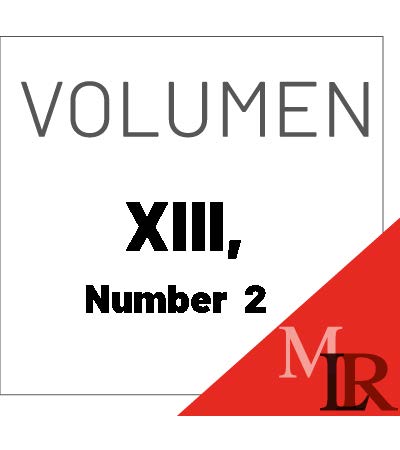1968: One Year In the Life of the Mexican Federal Judiciary
Main Article Content
Abstract
1968 is considered a mythical year in many parts of the world. In Mexico, it has acquired an almost sacred status. The student movement is com¬monly viewed as the beginning of the prolonged process of democratic transition that has unfolded in the last decades. Although there is very abundant literature about the events of that year, the role that the Mexican Federal Judiciary (MFJ) played in them has practically not been examined. The article analyzes the si¬tuation and performance of the Supreme Court of Justice and the MFJ during that single year. For this purpose, the essay examines the following aspects: the composition, organization and resources of the federal courts; judicial statistics; judicial precedents; judicial ideology and public perception on the justice system; and finally, the intervention of federal judges in the judicial proceedings instituted against the students and other leftist political dissidents. The article concludes that the MFJ was subject to many constraints and limitations that, for good measure, hampered its role in the defense of constitutional order. Twenty years later the reforms leading to the transformation of the Supreme Court of Justice into a constitutional court were started, favoring a more active intervention of judges and courts in the protection and defense of fundamental rights.
Article Details

Este obra está bajo una licencia de Creative Commons Reconocimiento-NoComercial-SinObraDerivada 4.0 Internacional.
References
Terry H. Anderson, 1968: The End and the Beginning in the United States and Western Europe, 16-17 SOUTH CENTRAL REV. 1 (1999-2000).
MICHAEL SEIDMAN, THE IMAGINARY REVOLUTION. PARISIAN STUDENTS AND WORKERS IN 1968, 1 ff. (Berghahn Books, 2004).
Soledad Loaeza, México 1968: los orígenes de la transición, 30 FORO INTERNACIONAL 66-92 (1989).
ELENA PONIATOWSKA, MASSACRE IN MEXICO (Missouri University Press, 1991).
PABLO GONZÁLEZ CASANOVA, LA DEMOCRACIA EN MÉXICO 36-37 (Era, 1997); English transl.: DEMOCRACY IN MEXICO (Oxford University Press, 1970).
Héctor Fix-Fierro, El poder del Poder Judicial. El Poder Judicial de la Federación en el siglo XX, in EL PODER DEL PODER JUDICIAL Y LA MODERNIZACIÓN JURÍDICA EN EL MÉXICO CONTEMPORÁNEO 233-316 (UNAM, 2020).
José Antonio Caballero Juárez, De la marginalidad a los reflectores. El renacimiento de la administración de justicia en México, in UNA HISTORIA CONTEMPORÁNEA DE MÉXICO: LAS INSTITUCIONES 163-193 (Ilán Bizberg and Lorenzo Meyer, eds., 2009).
Julio Ríos Figueroa, El gobierno del Poder Judicial y la carrera judicial en México, 1917-2017, in CIEN ENSAYOS PARA EL CENTENARIO. CONSTITUCIÓN POLÍTICA DE LOS ESTADOS UNIDOS MEXICANOS: ESTUDIOS POLÍTICOS (Gerardo Esquivel, Francisco Ibarra Palafox and Pedro Salazar Ugarte, eds., 2017).
Héctor Fix-Fierro, La carrera judicial en el Poder Judicial de la Federación, in EL PODER DEL PODER JUDICIAL, supra note 6, 415-457.
Ana Laura Magaloni and Layda Negrete, Desafueros del poder. La política de decidir sin resolver, 2 TRAYECTORIAS. REVISTA DE CIENCIAS SOCIALES DE LA UNIVERSIDAD AUTÓNOMA DE NUEVO LEÓN (2000).
HÉCTOR FIX-FIERRO, EL AMPARO ADMINISTRATIVO Y LA MEJORA REGULATORIA 62 ff. (UNAM, 2005).
JOSÉ RAMÓN COSSÍO DÍAZ, LA TEORÍA CONSTITUCIONAL DE LA SUPREMA CORTE DE JUSTICIA 114 ff. (Fontamara, 2002).
RICARDO POZAS HORCASITAS, LA DEMOCRACIA EN BLANCO: EL MOVIMIENTO MEDICO EN MÉXICO, 1964-1965 (Siglo XXI-UNAM, 1993).
VOKMAR GESSNER, LOS CONFLICTOS SOCIALES Y LA ADMINISTRACIÓN DE JUSTICIA EN MÉXICO (UNAM, 1984).
Jorge A. Bustamante, La justicia como variable dependiente, in TEMAS Y PROBLEMAS DE LA ADMINISTRACIÓN DE JUSTICIA 13-44 (José Ovalle Favela, ed., 1982).
MIGUEL DE LA MADRID, CAMBIO DE RUMBO. TESTIMONIO DE UNA PRESIDENCIA, 1982-1988, 717 (FCE, 2004).
Héctor Fix-Fierro, Judicial Reform in Mexico: What Next? in BEYOND COMMON KNOWLEDGE. EMPIRICAL APPROACHES TO THE RULE OF LAW 240-289 (Erik G. Jensen y Thomas C. Heller, eds., 2003).
Alberto Abad Suárez Ávila, The Mexican Supreme as a Protector of Human Rights, 4 MEX. L. REV. 239-260 (2012).




















